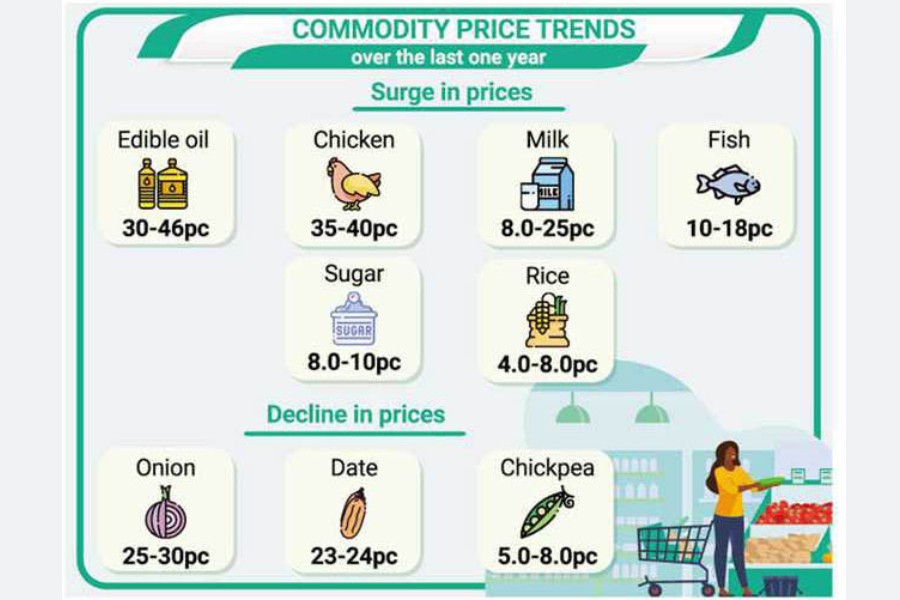Consumer spending has increased remarkably ahead of Ramadan this year amid a rising trend in prices of six key essentials including rice, edible oil, sugar, chicken meat, milk and fish.
The prices of onion, date, chickpea and some others essentials might remain low or static this Ramadan compared to that of last year but vegetables might be pricier, said insiders.
However, consumer association urged the government to cut import duty on some essential items like edible oil and sugar and to step up market monitoring ahead of the fasting month which would start in mid-April.
Rice prices hit the second highest this month as coarse rice was selling at Tk 48-Tk 52, medium at Tk 56-Tk 60 and finer at Tk 66-Tk 82 per kilogram, according to Trading Corporation of Bangladesh (TCB) and city groceries.
The current prices were 4.0-8.0 per cent higher than that of last year, said TCB.
Prices of beef, mutton, brinjal, cucumber, puffed rice, coriander leaf, tomato and few other items might remain static this Ramadan comparing to the previous year, according to market sources.
Cooking oil prices increased sharply as cost of soybean oil reached maximum Tk 160 a litre because many companies started supplying quarter-litre bottle at Tk 40.
Now the price of one-litre soybean jar was Tk 137-Tk 139 and half-litre Tk 70-Tk 72.
The price of palm oil, the key edible oil for commoners, shot up to Tk 110-Tk 116 a litre while loose soybean oil to Tk 126-Tk 130 a litre in recent times.
The TCB data showed that edible oil was now 30-46 per cent pricier than that of a year ago.
Sugar prices hit Tk 72-Tk 78 a kg at retail level in March-April period which was Tk 64-Tk 72 a kg during Ramadan last year.
Broiler chicken prices also increased to Tk 165-Tk 170 a kg while Sonali/Pakistani to Tk 300-Tk 340 a kg. The current prices were 35-40 per cent higher than that of a year ago, according to TCB.
Pasteurized liquid milk prices increased by 8.0-25 per cent in a month as one litre of milk was retailing at Tk 75 while quarter litre at Tk 25.
Prices of half-litre milk pack had increased to Tk 40 from Tk 35 earlier.
After raising the prices of liquid milk by state-run milk producing company -- Milk Vita -- on March 13 last, many other companies started following it, said Jewel Rana, a grocer at West Dhanmondi.
Powdered milk prices also increased by 8.0-10 per cent in last one month, he added.
Prices of fish, both cultured and indigenous, increased by 10-18 per cent in a month amid the imposition of a fishing ban on major sanctuaries by the government under its hilsa conservation programme, said traders. According to kitchen market sources, prices of cultured fish like pangasea, rui, tilapia and koi went by Tk 30-Tk 40 a kg during the ban period.
Consumers Association of Bangladesh (CAB) vice-president SM Nazer Hossain said commoners were hit hard by skyrocketing prices of six key commodities.
Though prices of some essentials like beef, chickpea and onion were a little bit lower or remained static now, he said, these could hardly help the consumers as prices of key commodities like rice, cooking oil, farm chicken, cultured fish, milk and sugar were much higher. Despite their repeated requests, the government didn't review milk prices, he added. "We have also been requesting the government for last one year to review import duties on edible oil and sugar."
Mr Hossain said now there was nearly 60 per cent import duties on sugar while 19 per cent on edible oil. The National Board of Revenue (NBR) should review it as edible oil prices had increased by 50 per cent to 60 per cent in the international market since May 2020.
He further said sugar prices had increased by 50-55 per cent in the global market during this period. Mr Hossain also called for strengthening market monitoring to prevent any artificial price hike. Prof Golam Hafeez Kennedy, a value chain expert, said the rice market should be brought under strict monitoring as Boro harvest started in few places while both the private and public sectors import a handsome volume of the staple.
He suggested that the agencies concerned like Bangladesh Bureau of Statistics (BBS) and Directorate General of Food should provide timely-authentic data on local production, imports of products and its availability in the market.
"And the government should give top priority to rice procurement from domestic sources during this Boro harvesting season taking into account the ongoing pandemic and any kinds of natural disasters," he added.


